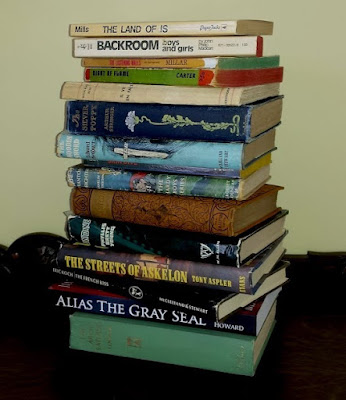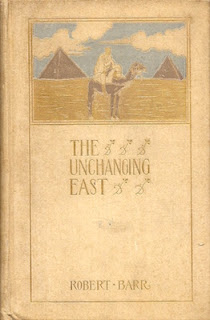The Dust Flower
Basil King
New York: Harper, 1922
350 pages
Basil King wrote the two best novels I read last year. The first,
The Thread of Flame, is about a wealthy American who loses his memory and identity to shell shock on the Great War battlefields of France. He manages to make his way home to the United States, where he finds work as a labourer, and comes to embrace his new, modest life. The later novel,
The Empty Sack, also features a wealthy American man
who has been transformed by the conflict. In this case, grave injury results in spiritual awakening, and he looks to better the lives of a less fortunate woman and her family through marriage.
The Thread of Flame was published in 1920.
The Empty Sack was published in 1921. My expectations for
The Dust Flower, Basil King's 1922 novel, were high. Though the book disappointed, it did so in an unexpected fashion.
The Dust Flower begins with a flap between New York lawyer Rashleigh Allerton and his fiancée Barbara Walbrook:
She was standing over him, high-tempered, imperious. "So it's come to this," she said, with decision; "you've got to choose between a stupid, vulgar
lot of men, and me."
He gritted his teeth. "Do you expect me to give
up all my friends?"
"All your friends! That's another matter. I'm
speaking of half a dozen profligates, of whom you
seem determined – I must say it, Rash; you force
me to it – of whom you seem determined to be one."
Rash had shown up the previous evening after having had a drink at his club and Barbara isn't at all happy. She removes her engagement ring, fully expecting Rash to beg for forgiveness. But he doesn't:
"I picked up a book at the club the other day."
Not being interested, she made no response.
"It was the life of an English writing-guy."
Though wondering what he was working up to, she
still held her peace.
"Gissing, the fellow's name was. Ever hear of
him?"
The question being direct, she murmured: "Yes;
of course. What of it ?"
"Ever hear how he got married?"
"Not that I remember."
"When something went wrong – I've forgotten
what – he went out into the street with a vow. It
was a vow to marry the first woman he met who'd
marry him."
Rash, being rash, does just that, proposing to Letty Gravely, a penniless, homeless young woman he encounters on a Central Park bench. She's assured that the marriage would be nothing more than a business relationship; its purpose is to wring Barbara's heart. "I'm not looking for a wife," he tells Letty. "I only
want a woman to marry – a woman to whom I can
point and say, See there! I've married – that."
This reader thought those words would bring an abrupt end to the conversation, but Letty is unworldly and impressionable. After much urging, Rash convinces her to marry him that afternoon. By the following morning, both are regretting their union. Rash considers suicide, before rushing off to tell Barbara what he's done. Meanwhile, Letty, left alone in the Allerton mansion on East Sixty-seventh Street, "only a few doors from Fifth Avenue," finds a friend in Steptoe, Rash's elderly butler and valet. A foundling of uncertain parentage, the servant raised himself up from the gutter and sees an opportunity to help Letty do likewise.
 |
Steptoe and Letty, as depicted by Pruett Carter
in the October 1921 issue of Good Housekeeping. |
Letty's education under the old man brings some unexpected comedy to the novel. I say "unexpected" because I can't remember humour of any sort in other King novels. Steptoe isn't nearly as refined as he believes, and his first attempt at being Henry Higgins very nearly fails when he mistakes a parade of models in an exclusive boutique for ladies come to cast haughty, disapproving glances at Letty:
The spectacle grew dazzling, difficult for Steptoe to keep up with. He and Letty were plainly objects of interest to these grand folk, because there were now four or five of them. They advanced, receded, came up and studied them, wheeled away, smiled sometimes at each other with the high self-assurance of beauty and position, pranced, pawed, curveted, were noble or coquettish as the inner self impelled, but always the embodiment of overweening pride. Among the "real gentry" as he called them, there had unfailingly been for him and his colleagues a courtesy which might have been called only a distinction in equality, whereas these high-steppers....
 |
| Good Housekeeping, November 1921 |
More than laughs, the thing that really sets the
The Dust Flower apart from other King novels – the six I've read, anyway – is simplicity of plot. Where their stories are intricate and so very, very clever, things here progress much like the reader might anticipate. Rash is forced to choose between the woman to whom he was engaged for no good reason and the "wife" who proves to be a kindred spirit. In other King novels the answer wouldn't be at all clear, but here King follows Hollywood convention. I think it worth noting that the silent screen adaptation of
The Dust Flower coincided with the novel's publication in book form.
 |
| The Gazette (Montreal), 29 July 1922 |
I don't expect that anyone reading this review will bother with this novel. No flower in the dustbin, it may be the least interesting of King's twenty-two books. My recommendation – because the man is worth reading – is to begin with
The Empty Sack.
The Thread of Flame comes next.
My first read of the year, I'm hoping
The Dust Flower will end up as the most disappointing.
Trivia: Rash follows fellow wealthy Manhattanite Chipman Walker of King's 1914 novel
The Letter of the Contract in planning revenge on a woman by turning to drink. Neither man is able to follow through.
Object: A bulky hardcover with four illustrations by Hibbert V.B. Kline, including that used on the jacket. I purchased my copy last month from an Albany bookseller. Price: US$19.50.
Access: The Dust Flower first appeared serialized in
Good Housekeeping (September 1921 - April 1922)with illustrations by Pruett Carter. I much prefer Carter's illustrations. This is his imagining of the very same encounter between Rash and Barbara depicted above by Kline:
The University of Prince Edward Island, in Basil King's home province, does not hold a copy of
The Dust Flower. It can be found in five Canadian universities, but not one of our public libraries. Once again, Library and Archives Canada fails.
At the time of this writing, only one copy of the Harper first edition was being offered online. Stamped "Property of U.S. Government," purchase at your own risk. Price: US$15.00. As far as I've been able to determine, the only other edition is a long out-of print Grosset & Dunlop cheapo. The Harper first edition can be read
here –
gratis – courtesy of the Thomas Fisher Rarte Book Library and the invaluable Internet Archive.
Related posts:


































